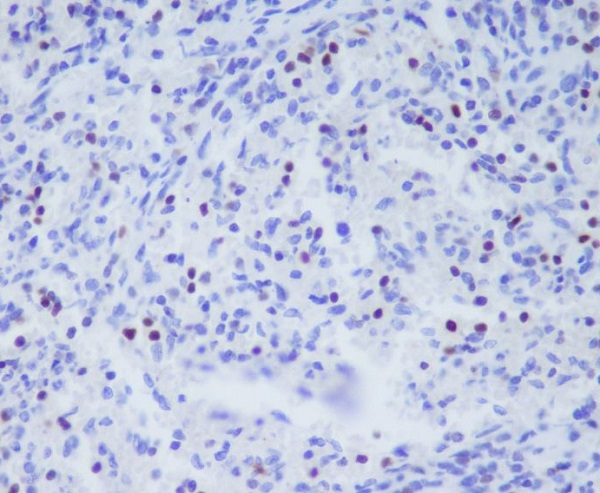
| WB | 咨询技术 | Human,Mouse,Rat |
| IF | 咨询技术 | Human,Mouse,Rat |
| IHC | 1/100-1/200 | Human,Mouse,Rat |
| ICC | 技术咨询 | Human,Mouse,Rat |
| FCM | 咨询技术 | Human,Mouse,Rat |
| Elisa | 咨询技术 | Human,Mouse,Rat |
| Aliases | T bet; T box 21; T PET; TBET; TBLYM; Tbx21; TPET;;TBX21 |
| WB Predicted band size | 58 kDa |
| Host/Isotype | Rabbit IgG |
| Antibody Type | Primary antibody |
| Storage | Store at 4°C short term. Aliquot and store at -20°C long term. Avoid freeze/thaw cycles. |
| Species Reactivity | Human |
| Immunogen | A synthesized peptide derived from human TBX21 |
| Formulation | Purified antibody in PBS with 0.05% sodium azide,0.05% BSA and 50% glycerol. |
+ +
以下是关于TBX21(T-bet)抗体的3篇代表性文献,简要总结如下:
1. **"A novel transcription factor, T-bet, directs Th1 lineage commitment"**
- **作者**: Szabo, S. J. 等
- **摘要**: 该研究首次克隆并鉴定了转录因子T-bet(TBX21),揭示了其在Th1细胞分化和IFN-γ表达中的关键作用。通过制备特异性抗体,作者证实T-bet蛋白在Th1细胞中高表达,并驱动Th1相关基因的调控。
2. **"T-bet is required for Th1 lineage development and IFN-γ production"**
- **作者**: Lighvani, A. A. 等
- **摘要**: 文章利用基因敲除小鼠模型和T-bet特异性抗体,证明T-bet缺失导致Th1细胞分化缺陷及IFN-γ分泌减少,强调了T-bet在Th1/Th2平衡中的主导作用。
3. **"T-bet regulates Th1 responses through essential effects on both gene expression and chromatin accessibility"**
- **作者**: Afkarian, M. 等
- **摘要**: 研究结合ChIP-seq和RNA分析,使用T-bet抗体鉴定其直接靶基因,阐明T-bet通过调控染色质可塑性和基因表达维持Th1细胞功能,为自身免疫疾病机制提供了新见解。
4. **"Role of T-bet in commitment of TH1 cells during Listeria infection"**
- **作者**: Sullivan, B. M. 等
- **摘要**: 通过T-bet抗体检测感染李斯特菌的小鼠模型,研究发现T-bet在感染早期促进Th1细胞分化,并抑制Th2通路,证实其在抗胞内病原体免疫中的关键作用。
这些文献均通过TBX21抗体进行蛋白定位、表达分析或功能研究,推动了Th1细胞分化及免疫调控机制的解析。
The TBX21 antibody targets the T-box transcription factor 21 (TBX21), also known as T-bet, a critical regulator of immune cell differentiation and function. TBX21. encoded by the *TBX21* gene, belongs to the T-box protein family characterized by a conserved DNA-binding domain. It is pivotal in driving the development of T-helper 1 (Th1) cells by promoting interferon-gamma (IFN-γ) production and suppressing Th2 lineage commitment. TBX21 is expressed in immune cells, including CD4+ T cells, natural killer (NK) cells, and dendritic cells, where it modulates cytokine profiles and effector functions.
Antibodies against TBX21 are widely used in immunology research to study Th1/Th2 balance, autoimmune diseases, infections, and cancer. They enable detection of TBX21 protein levels via techniques like Western blotting, flow cytometry, and immunohistochemistry. Such studies have linked TBX21 dysregulation to conditions like multiple sclerosis, rheumatoid arthritis, and asthma. Additionally, TBX21 antibodies help explore its role in tumor microenvironments, where Th1 responses often correlate with improved cancer outcomes.
The development of specific, high-affinity TBX21 antibodies has advanced understanding of transcriptional control in immunity, offering insights into therapeutic strategies targeting immune polarization. These tools remain essential for dissecting pathways governing adaptive and innate immunity.
×